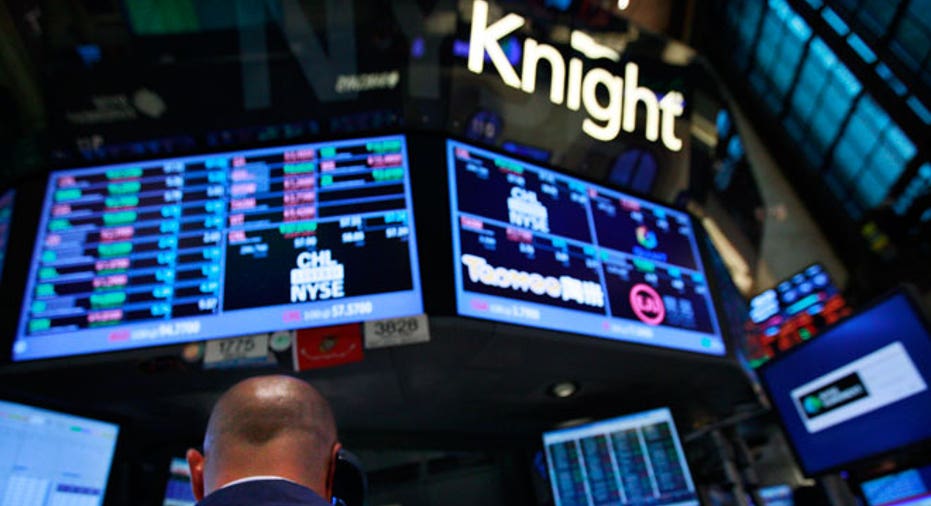Investor Psyche Takes Another Blow With Knight Capital Glitch

Shell-shocked from the worst financial crisis since the Great Depression, retail investors have been welcomed to the post-2008 world by a string of structural hiccups that has further eroded confidence in the safety and soundness of the increasingly-complex capital markets.
With the Flash Crash and the Facebook (NASDAQ:FB) fiasco still within view, the latest challenge to investor confidence came this week in the form of a software glitch at Knight Capital Group (NYSE:KCG) that caused the market maker to take a stunning pretax loss of $440 million and launch a frantic search for a lifeline.
The aftermath has investing professionals concerned about the ongoing retreat of retail investors and grasping for potential solutions to restore confidence in the system.
“They don’t really trust equities. That’s why money has been pouring into bond funds at virtually no return,” said Bruce McCain, chief investment strategist at KeyCorp.’s (NYSE:KEY) Key Private Bank. “These sorts of questions about basic fairness and competence to carry out a simple transaction just worry people even more.”
Underscoring the apparent distrust for stocks, long-term equity mutual funds have shed $204.7 billion in assets since the month after the May 2010 Flash Crash, according to data provided by the Investment Company Institute. Funds experienced a decline of $2.7 billion last week alone, including $1.4 billion in U.S. funds.
Knight Capital’s problems only seem to add to the lack of confidence. The Jersey City, N.J. firm is the largest handler of stock orders for U.S. retail brokerages, trading an estimated 725 million shares a day for the likes of TD Ameritrade (NASDAQ:AMTD).
Complex Markets
A software glitch caused Knight Capital to erroneously buy $5 billion of stock in a trade that was intended to be executed over five weeks but ultimately took place in just 20 minutes, FOX Business’s Charlie Gasparino reported.
“We’ve seen enough of these computer mistakes since the Flash Crash that it makes you wonder the impact of computer trading on the market,” Robert Steven Kaplan, a professor at Harvard and former vice chairman at Goldman Sachs (NYSE:GS), told FOX Business.
Darrell Duffie, a finance professor at Stanford, said the Knight Capital incident could “raise concerns that the May 6 Flash Crash risks still exist.”
If nothing else, the Knight Capital trading glitch underscores the complexity of today’s capital markets, which have become increasingly dominated by complicated trading algorithms.
“Consumers don't understand markets any longer so they increasingly distrust our stock markets and are withdrawing,” David Weild, a senior advisor at Grant Thornton and former vice chairman at the Nasdaq Stock Market, wrote in an email. “Deregulation stimulated competition but in extremis: The computer arms race that ensued, enabled by the SEC, has introduced a level of complexity and behaviors that is undermining investor confidence.”
Isolated Incident?
Perhaps underscoring this thinking, shares of retail brokerages suffered steeper losses than the broader markets on Thursday, including Charles Schwab (NASDAQ:SCHW), E*Trade Financial (NASDAQ:ETFC) and Ameritrade.
Others see the Knight Capital incident as a one-off event that is far too inside baseball to be added to the list of confidence-crumbling events of recent years. After all, few retail investors had likely ever heard of Knight Capital before this week, despite the firm’s role as a crucial cog in the capital-market system.
“While Knight's investors and employees are obviously impacted, I don't think this is an issue that affects ‘investor confidence’ broadly,” said one industry veteran who didn’t want to be quoted about Knight.
Retail investors “ought to have a three- to five-year horizon,” said Kaplan. “A one-day trauma like this or even the Flash Crash is not going to be relevant to you if you have that kind of perspective.”
‘Blow to Investor Confidence’
The Knight Capital trading glitch could also loom over other companies in the capital markets business. Shares of the Jersey City, N.J.-based firm have plummeted more than 70% since Tuesday’s close to levels unseen since the Clinton Administration.
“For now I think any investor of any institution with large algorithmic trading positions or large computer operations that are potentially unstable will pay less for that stock,” said Jim Rickards, a partner at New York-based hedge fund JAC Capital Advisors. “I definitely think it’s a blow to investor confidence. I’m sure whatever happened is highly technical and buried in some algorithm. It looks like Knight can’t even figure it out itself but it doesn’t matter because whatever it was, it was a black box style mix that scrambled the markets.”
Mulling Potential Fixes
For the broader markets, it’s not clear if there is an easy solution that would restore investor confidence.
Weild said increasing tick sizes would help “simply stock markets” and boost confidence. He also pointed to more human intermediation.
In fact, market participants credited speedy intervention from specialists at the NYSE Euronext’s (NYSE:NYX) New York Stock Exchange for preventing the Knight issues from causing chaos.
Rickards suggested more drastic measures, including banning derivatives, separating commercial banks from investment banks and banning high-frequency trading.
“The systems are so complex and so interconnected that no amount of regulation will ever stay on top of it,” said Rickards. “Therefore the solution is to reduce the complexity of these markets.”
However, McCain warned moves such as eliminating derivatives may be “too simplistic.”
“Recognize that innovation is not only normal but it’s healthy and ultimately it’s always hard to stuff the genie back in the bottle when it’s out,” said McCain.
Charles Geisst, a finance professor at Manhattan College, said confidence could be bolstered by more sophisticated oversight of the markets by the Securities and Exchange Commission.
“People are starting to realize that the SEC is far, far behind here,” said Geisst. “It’s almost like the market is dealing with calculus while the SEC is dealing with third-grade arithmetic. I don’t think they have the resources.”



















